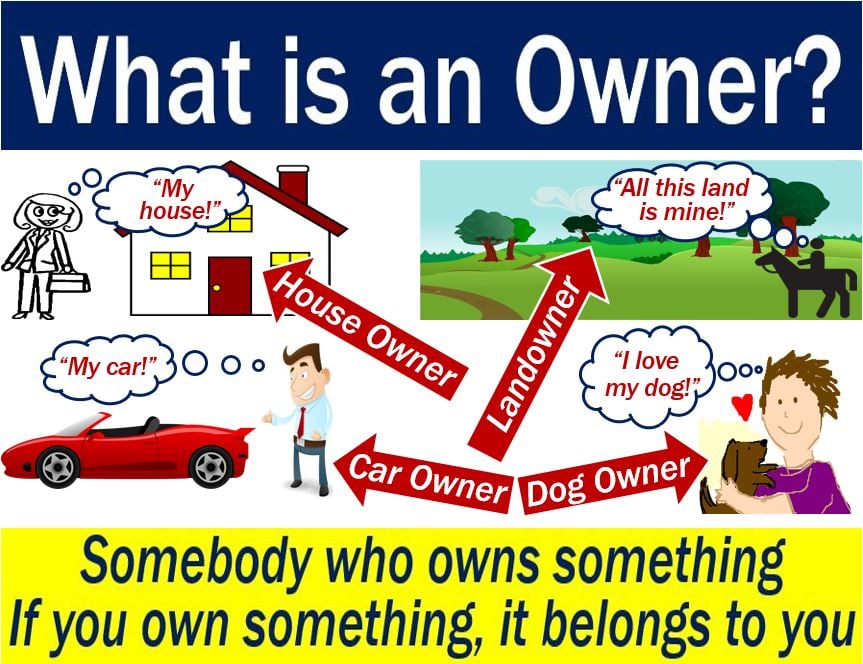Owner Of Doritos - Understanding Who Holds The Chips
Have you ever stopped to think about who truly stands behind some of the things we see and enjoy every single day? It's a common thought, perhaps, to wonder about the people or organizations that bring our favorite items into existence, or who are the ones that hold the actual legal papers for them. This curiosity, you know, it stretches beyond just the things we buy; it touches upon who has command over all sorts of possessions, whether small or quite large.
The idea of an "owner" is, in some respects, a very simple one, yet it carries quite a bit of meaning. It speaks to someone who has something, or to whom property truly belongs. This could be a person with the legal or proper paperwork for an item, or perhaps someone who simply has possession of something. It is that individual or group that has, as a matter of fact, the rightful claim to an item, whether that item is a personal possession or something much bigger, something that many people recognize and use.
So, when we consider something like Doritos, a snack many people know and enjoy, a question might just pop into our heads: who is the owner of Doritos? It is a question that leads us to think about what ownership truly means in the context of such a widely known product. We can explore this idea by looking at what it means to be an owner, drawing from general concepts of holding title or having something as a possession, which, basically, helps us consider the idea of the owner of Doritos.
- What Is Illegal On Snapchat
- Little Tokyolv
- Checkpointbot
- Southington Moving Company
- University Of Arizona Global Campus Accreditation
Table of Contents
- What Does it Mean to Be an Owner?
- Who is the Owner of Doritos?
- How Does One Become the Owner of Doritos?
- What Responsibilities Come with Being the Owner of Doritos?
What Does it Mean to Be an Owner?
The word "owner" carries with it a fundamental concept of having something, of holding something as your own. It speaks to a person who possesses something, or a party to whom a piece of property belongs. This idea is, arguably, quite central to how we understand things in the world around us. For instance, if you have a car, you are the one who owns that car, meaning you have the legal paperwork for it, and it is yours to use. The previous person who had a house, for example, built an addition on the back, making that house, with its new part, truly theirs.
To have something as a possession means it is something that is yours. This could be something as simple as the clothes you put together yourself, or a space you truly desire for yourself, like wanting a room that is completely your own. The idea of ownership stretches across many different kinds of things, from small personal items to much larger holdings. It is the person or entity that has the rightful or legal claim to something, the one who can say, "This is mine." It's that kind of connection, you know, that brings a sense of belonging and control over an item or even an idea.
This idea of holding something as one's own, of having the legal or rightful claim, applies to many situations. We often hear questions like, "Are you the owner of this car?" when someone wants to know who has the legitimate paperwork for it. Or, if something goes missing, like a lost pet, people might say, "We still haven't found the dog's owner," looking for the one who has the true connection and responsibility for that animal. This concept, in short, is about identifying the one to whom something genuinely belongs, which is a fairly straightforward way to think about it.
- Quavo Response
- Lauren Hamdem
- 21 Questions Game Freaky Friends
- What Happened On Camp Rock Set
- Definition Of A Simp
The Core Idea of the Owner of Doritos
When we apply this core idea of ownership to something like Doritos, we are, in a way, asking who has the proper legal standing for this well-known snack. It’s not about a single person, perhaps, holding a bag of chips in their hand, but rather about the entity that has the legal or rightful paperwork for the product itself. This involves the rights to its creation, its name, and its overall presence in the market. It’s about who truly holds the title to this particular item, which is a bit different from owning a house or a car.
The concept of an owner, in this larger context, refers to the one to whom the product, Doritos, truly belongs. It’s the party that has the authority and the legal right to decide about its making, its distribution, and its overall direction. This means that the owner is the one who has, in fact, possession of the brand and everything that goes with it. It's a way of looking at who has the ultimate say and who carries the ultimate responsibility for such a widely recognized product. This is, you know, a pretty big responsibility for any owner.
Consider the example of someone who owns a collection of restaurants; they have the overall legal claim to each establishment within that collection. Similarly, the owner of Doritos would be the entity that has the overall legal claim to the product line, including all its varieties and related items. This is the heart of what it means to be the owner in such a situation: having that central authority and possession over something that reaches many people. It’s about the legitimate claim, rather, to a significant item that is enjoyed by many.
Who is the Owner of Doritos?
When we ask who the owner of Doritos is, we are trying to identify the entity that has the legal or rightful paperwork for this particular snack product. The definition of an owner tells us it's a person who has something, or one who has the legal or proper claim to it. In the case of a large, widely distributed item like Doritos, it's not usually a single individual, but rather a larger organization or company that holds this kind of possession. This organization is the one to whom the product truly belongs, in a legal sense, you know.
The owner of Doritos, therefore, is the one who has the official title to the product. This means they are the ones who have the authority over its making, its selling, and its general presence in the world. It is the entity that has, as a matter of fact, the proper legal claim to the Doritos brand. This is similar to how a person might own a specific car, holding its title, or how a family might own a house, having the deeds to it. The principle of ownership remains, even if the item being owned is a product line rather than a physical piece of property.
To put it simply, the owner of Doritos is the party that has the true possession and legal right to the product. This means they are the ones who can make decisions about its future, its flavors, and how it is presented to people. They are the ones who have the overall say, so to speak, in how the product is managed and developed. This is the very core of what it means to be the owner of something, especially when that something is a popular item that reaches a lot of people every day.
Defining the Owner of Doritos
Defining the owner of Doritos means pinpointing the entity that holds the ultimate legal claim and possession over the product. According to the idea of ownership, this is the one to whom the item genuinely belongs, the one with the legal or rightful paperwork. It’s not just about having a bag of chips in your cupboard; it’s about having the authority over the entire brand, its recipes, its packaging, and its distribution. This is, you know, a really significant kind of ownership, extending far beyond a single item.
The owner, in this context, is the one who has the true and proper title to the Doritos product. This is the same principle that applies when we talk about a previous owner of a house who built an addition, or when a painting is returned to its rightful owner. The idea is that there is a legitimate party that holds the ultimate claim. For Doritos, this means the organization that has the legal right to produce, market, and sell the product, making it theirs in a very real and official way.
So, the definition centers on legal possession and proper claim. The owner of Doritos is the one who has this kind of possession, the one who can direct its path and ensure its continued presence. It’s about the legal framework that places the product under the care and control of a specific entity. This is, actually, how ownership works for many large products and brands, where the legal claim is held by an organization rather than a single individual, though the core meaning of "owner" remains constant.
How Does One Become the Owner of Doritos?
Becoming the owner of something, whether it's a small personal item or a large product line like Doritos, generally involves acquiring it through a proper process. To have something as a possession, to have that legal or rightful title, usually means it was either created by you, purchased by you, or transferred to you in some legitimate way. For a brand like Doritos, the path to ownership would typically involve its original creation and then, perhaps, its acquisition by a larger organization. This is, you know, how many big products come to be owned by big companies.
The process of becoming the owner of Doritos, in a broad sense, would follow the general rules of acquiring something. Just as someone might buy a house in McKinney, TX, and become its owner, an entity would gain ownership of a product through a similar kind of transaction. It’s about having that legal transfer of possession, that change of hands where the rightful title moves from one party to another. This is how, basically, one comes to have something as their own, whether it’s a car or a widely recognized snack.
So, to be the owner of Doritos means that at some point, the legal claim to the product was established or transferred. This could involve the initial development of the product and its brand, or a later purchase where one organization acquired the rights from another. It’s about securing that rightful paperwork and possession, ensuring that the product truly belongs to that entity. This is how, you know, items come to be owned, by having that clear and proper connection to a specific party, making them the legitimate owner.
The Path to Being the Owner of Doritos
The path to being the owner of Doritos involves the journey of the product itself, from its initial creation to its current state of ownership. It’s about how the legal claim to this snack was established and maintained over time. Just as a person might become the owner of a house by buying it, or someone might make their own clothes and thus own them, the ownership of Doritos came about through a process of creation and perhaps subsequent transfer of legal possession. This is, in a way, the story of how it came to belong to its current holder.
For something as widely known as Doritos, the path to ownership means that the entity currently holding the title has a legitimate claim. This could be through having originally developed the product, or through a process where they acquired the legal rights from another party. It’s about having that official paperwork that shows the product belongs to them, much like how a painting is restored to its rightful owner after being lost. The journey of ownership is about establishing and maintaining that proper connection to the item, ensuring it is truly possessed by the right party.
So, the path to being the owner of Doritos is rooted in the concept of having possession and rightful title. It’s about the sequence of events that led to the current entity holding the legal claim. This means they are the ones who, as a matter of fact, have the authority to manage and direct the product. It’s about the legitimate acquisition of the item, ensuring that it is truly theirs to command, which is, you know, a very important part of what ownership entails for any item, big or small.
What Responsibilities Come with Being the Owner of Doritos?
Being the owner of anything, whether it's a car, a house, or a widely popular snack like Doritos, carries with it a set of duties and obligations. The concept of ownership implies a certain level of care and oversight for the item that belongs to you. For instance, the previous owner of a house might have built an extension on the back, showing their investment and care for the property. Similarly, the owner of a product like Doritos has responsibilities related to its quality, its reputation, and its presence in the market. This is, you know, a pretty big deal when it comes to something so widely consumed.
When you have the legal or rightful title to something, you are generally expected to look after it. This means ensuring its well-being and its proper standing. For the owner of Doritos, this would translate into responsibilities for maintaining the product's quality, ensuring its safe production, and managing its public image. It’s about upholding the trust that people place in the item, making sure it continues to meet expectations. This is, essentially, what it means to have something as a possession and to be accountable for it.
The idea of responsibility also comes into play when we think about something being restored to its rightful owner; it implies that the owner will take proper care of it once it is returned. In the same way, the owner of Doritos has the duty to ensure the product remains a trusted and enjoyed item. This involves making choices that benefit the product and those who consume it. It’s about, you know, carrying the weight of that legal possession and ensuring everything is handled properly.
- Blink 182 Concert Canceled Kansas City
- Pharrell Williams Triplets Names
- Richard Ayoade Star Wars
- Longest Marriage In History
- Adriana Checkik Twitter

Small Business Owner's Toolkit - Resources, Advice & Tools | Wolters Kluwer

Owner

Owner - definition and meaning - Market Business News